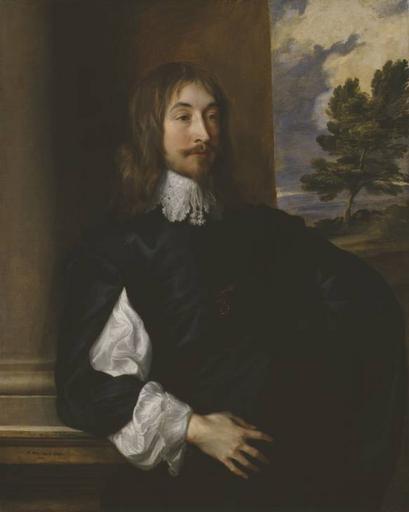MAKE A MEME
View Large Image

| View Original: | SirWilliamKilligrew.jpg (583x730) | |||
| Download: | Original | Medium | Small | Thumb |
| Courtesy of: | commons.wikimedia.org | More Like This | ||
| Keywords: people Sir William Killigrew (1606 – 1695) was an English court official under Charles I and Charles II.[1] He was the son of Sir Robert Killigrew (1580–1633) and Mary Woodhouse, of Kimberley, Norfolk, his wife. He was the elder brother to Thomas Killigrew. In 1625 or 1625, he married Mary Hill and they had seven children, of whom only sons Robert and William survived their father. Killigrew was knighted in May 1626. He was elected MP for Newport and Penryn, Cornwall in March 1628, but only sat for the latter. In 1629, he and his father were jointly awarded the Governorship of Pendennis Castle. However, after some trouble, he resigned in favour of Sir Nicholas Slanning[2] in April 1635. With partners, he attempted to drain the Lincolnshire fens, an immensely expensive undertaking. During the English Civil War he gave loyal and effective support to the King. At the Restoration he was made the Queen's Vice-Chamberlain, an influential and well-rewarded post. From 1664 to 1679 he was Member of Parliament for Richmond in Yorkshire. He was the author of four plays of some merit.[3] The four dramas, with their dates of publication, are: * Ormasdes, or Love and Friendship (1664) * Pandora, or the Converts (1664) * Selindra (1664) * The Siege of Urbin (1666). The tragicomedy The Siege of Urbin has often been considered his best play. Poet Edmund Waller addressed verses to Killigrew on the subject of Pandora, which indicate that the play was originally a tragedy; Killigrew revised it into a comedy after the tragic version failed onstage.[4] Sir William Killigrew (1606 – 1695) was an English court official under Charles I and Charles II.[1] He was the son of Sir Robert Killigrew (1580–1633) and Mary Woodhouse, of Kimberley, Norfolk, his wife. He was the elder brother to Thomas Killigrew. In 1625 or 1625, he married Mary Hill and they had seven children, of whom only sons Robert and William survived their father. Killigrew was knighted in May 1626. He was elected MP for Newport and Penryn, Cornwall in March 1628, but only sat for the latter. In 1629, he and his father were jointly awarded the Governorship of Pendennis Castle. However, after some trouble, he resigned in favour of Sir Nicholas Slanning[2] in April 1635. With partners, he attempted to drain the Lincolnshire fens, an immensely expensive undertaking. During the English Civil War he gave loyal and effective support to the King. At the Restoration he was made the Queen's Vice-Chamberlain, an influential and well-rewarded post. From 1664 to 1679 he was Member of Parliament for Richmond in Yorkshire. He was the author of four plays of some merit.[3] The four dramas, with their dates of publication, are: * Ormasdes, or Love and Friendship (1664) * Pandora, or the Converts (1664) * Selindra (1664) * The Siege of Urbin (1666). The tragicomedy The Siege of Urbin has often been considered his best play. Poet Edmund Waller addressed verses to Killigrew on the subject of Pandora, which indicate that the play was originally a tragedy; Killigrew revised it into a comedy after the tragic version failed onstage.[4] SirWilliamKilligrew.jpg File Anthony van Dyck - Portrait of Sir William Killigrew - Google Art Project jpg Higher resolution better color reproduction Sir William Killigrew 1606-1695 http //www tate org uk/servlet/ViewWork workid 25994 searchid 23109 tabview image 1638 creator Anthony van Dyck PD-old-100 William Killigrew Male portraits by Anthony van Dyck Paintings in Tate Britain Sir William Killigrew (1606 – 1695) was an English court official under Charles I and Charles II.[1] He was the son of Sir Robert Killigrew (1580–1633) and Mary Woodhouse, of Kimberley, Norfolk, his wife. He was the elder brother to Thomas Killigrew. In 1625 or 1625, he married Mary Hill and they had seven children, of whom only sons Robert and William survived their father. Killigrew was knighted in May 1626. He was elected MP for Newport and Penryn, Cornwall in March 1628, but only sat for the latter. In 1629, he and his father were jointly awarded the Governorship of Pendennis Castle. However, after some trouble, he resigned in favour of Sir Nicholas Slanning[2] in April 1635. With partners, he attempted to drain the Lincolnshire fens, an immensely expensive undertaking. During the English Civil War he gave loyal and effective support to the King. At the Restoration he was made the Queen's Vice-Chamberlain, an influential and well-rewarded post. From 1664 to 1679 he was Member of Parliament for Richmond in Yorkshire. He was the author of four plays of some merit.[3] The four dramas, with their dates of publication, are: * Ormasdes, or Love and Friendship (1664) * Pandora, or the Converts (1664) * Selindra (1664) * The Siege of Urbin (1666). The tragicomedy The Siege of Urbin has often been considered his best play. Poet Edmund Waller addressed verses to Killigrew on the subject of Pandora, which indicate that the play was originally a tragedy; Killigrew revised it into a comedy after the tragic version failed onstage.[4] | ||||